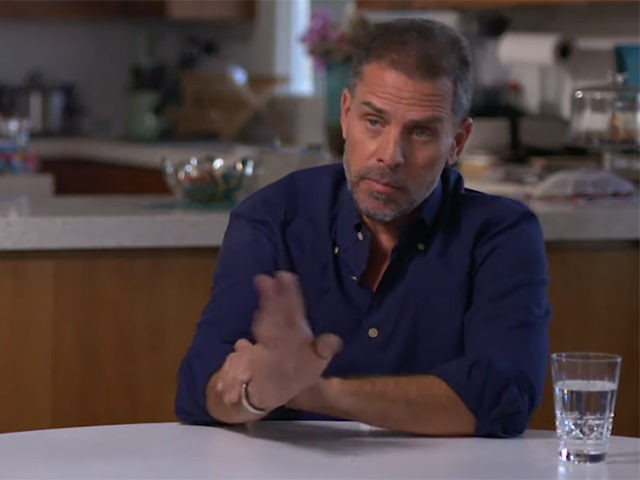A majority of Americans believe Hunter Biden showed “bad judgment” by actively pursuing business ventures overseas during his father’s tenure in the vice presidency.
A new survey conducted by Harvard University and the Harris Poll found that 58 percent of registered voters nationally think the younger Biden exercised “bad judgment” by taking a seat on the board of directors of Burisma Holdings, a Ukrainian oil and gas conglomerate, while his father was tasked with overseeing Obama administration policy in the region.
Furthermore, 27 percent of voters believed Hunter Biden’s decision to accept the position, which at times paid as much as $83,000 a month, may have broken U.S. laws regarding public corruption or conflicts of interest. Only 14 percent of those polled claimed the shadowy business dealing were “not an issue of concern.”
The results, which mirror a recent poll by the Associated Press showing that 69 percent of voters believe the Ukraine venture was “inappropriate,” do not bode well for either Hunter Biden or the former vice president, who has struggled on the campaign trail to explain his son’s foreign dealings.
In particular, both have failed to properly address how and why Hunter Biden secured an appointment to Burisma’s board in the first place. As Peter Schweizer, senior contributor at Breitbart News, detailed in his book, Secret Empires: How the American Political Class Hides Corruption and Enriches Family and Friends, Hunter Biden had no prior experience with either the energy industry or Ukraine before joining Burisma in April 2014.
Adding to the appearance of impropriety is the fact that Hunter Biden joined Burisma at a time the company was seen as actively courting western leaders to prevent further scrutiny of its business practices. The same month the younger Biden’s appointment was announced, the government of Great Britain froze accounts belonging to Burisma founder Mykola Zlochevsky under suspicion of money laundering. Zlochevsky, a former Ukrainian minister of natural resources, would later be accused of corruption for using his office to approve oil and gas licenses to Burisma.
A Ukrainian official with strong ties to Zlochevsky admitted in October the only reason that Hunter Biden secured the appointment was to “protect” the company from foreign scrutiny. The claim has credence given that at the time Joe Biden, as the sitting vice president, led Obama administration policy towards Ukraine in response to Russia’s invasion of Crimea. The former vice president’s influence was so immense that in 2016 he was able to force the Ukrainian government to fire its top prosecutor, Viktor Shokin.
Officially, the former vice president has asserted his threat to withhold U.S. aid to Ukraine if Shokin was not fired came from the Obama administration, which had lost confidence in the prosecutor’s abilities to root out corruption. Unofficially, though, it was well known that Shokin was investigating both Burisma and Zlochevsky for wrongdoing. Regardless of the reason, Shokin’s successor closed the probe into Burisma, allowing Zlochevsky to return to the country after having fled it in 2014.
The Harvard/Harris poll found similar results when respondents were asked about a $1.5 billion deal Hunter Biden inked with a subsidiary of the state-owned Bank of China in 2013. The lucrative deal, which created the private equity firm Bohai Harvest RST (BHR), has come under scrutiny because it came only 12 days after the younger Biden visited China with his father aboard Air Force Two. Officially, the then-vice president was visiting the country amid escalating tensions over islands in the South China Sea and decided to bring his granddaughter and son along. During an interview with Breitbart News Tonight in March 2018, however, Schweizer detailed the political machinations that preceded Hunter Biden’s venture with China:
In December of 2013, Vice President Joe Biden flies to Asia for a trip, and the centerpiece for that trip is a visit to Beijing, China. To put this into context, in 2013, the Chinese have just exerted air rights over the South Pacific, the South China Sea. They basically have said, ‘If you want to fly in this area, you have to get Chinese approval. We are claiming sovereignty over this territory.’ Highly controversial in Japan, in the Philippines, and in other countries. Joe Biden is supposed to be going there to confront the Chinese. Well, he gets widely criticized on that trip for going soft on China. For basically not challenging them, and Japan and other countries are quite upset about this.
Since its creation, BHR has invested heavily in energy and defense projects across the globe. Although Hunter Biden announced last month he was resigning from the company’s board, he is expected to keep his ten percent stake in BHR, which is estimated to be worth millions.
When voters were asked about this particular venture, 51 percent said it constituted “bad judgment” but was likely not illegal. Another 33 percent believed it may have been illega, and only 16 percent claimed it was “not an issue of concern.
Given that a majority of respondents asserted the younger Biden exercised “bad judgment,” it was not surprising that 51 percent also believed he should return all funds received through his dealings in China and Ukraine. Meanwhile, 49 percent stated such an act was not necessary if Hunter Biden pledged to not seek out any such ventures if his father was to become president.
The Harvard/Harris poll surveyed 1,810 registered voters from across the country between October 29 through October 31.

COMMENTS
Please let us know if you're having issues with commenting.